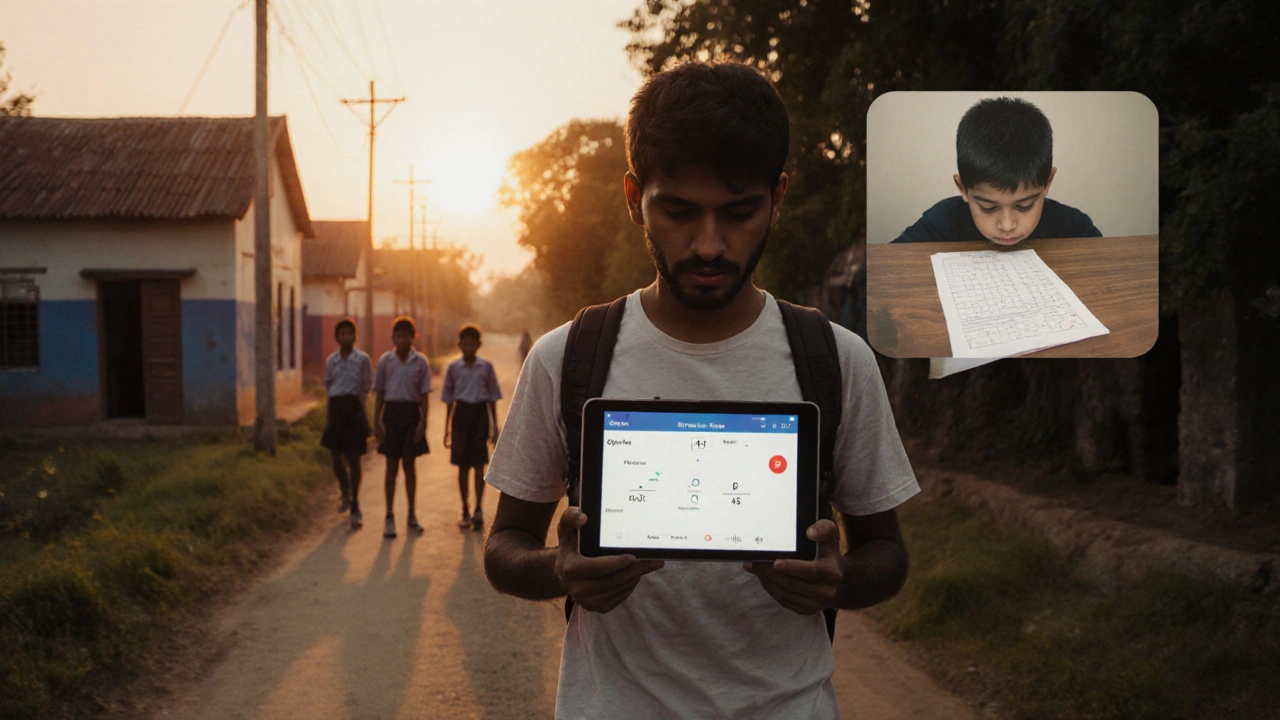JEE Rank 1 Study Plan Calculator
Calculate your ideal daily problem-solving targets based on your current level, available time, and target score. Just like Karan Mehta did.
Your Personalized Study Plan
Daily Problem Targets
Mathematics
Physics
Chemistry
Recommended Books
Based on Karan Mehta's strategy:
- Mathematics: Problems in Calculus of One Variable by I.A. Maron
- Physics: Concepts of Physics by H.C. Verma
- Chemistry: Organic Chemistry by Morrison & Boyd
Study Tips
Karan Mehta solved 120 problems daily while focusing on quality over quantity. Remember:
- Solve each problem twice
- Track patterns in mistakes
- Revise topics every 10 days
- Take one full rest day every two weeks
The name JEE Rank 1 is whispered in coaching centers across India like a legend. Every year, lakhs of students grind through sleepless nights, endless practice papers, and relentless pressure-all chasing that one spot at the top. But who actually holds it? And more importantly, how did they do it?
The 2025 JEE Advanced Rank 1: Karan Mehta
In 2025, Karan Mehta from Jaipur, Rajasthan, became the All India Rank 1 in JEE Advanced. He scored 342 out of 360-a near-perfect result. His raw scores: 114 in Physics, 115 in Chemistry, and 113 in Mathematics. He didn’t just crack the exam-he dominated it. Karan didn’t attend a premium coaching institute in Kota. He studied from a small town, using free YouTube lectures, a few well-chosen books, and a disciplined daily schedule.
What Makes JEE Rank 1 Different?
Most people assume JEE Rank 1 students are geniuses with photographic memories. That’s not true. Karan’s secret wasn’t brilliance-it was consistency. He solved 120 problems every single day, even on holidays. He didn’t skip weak topics. When he struggled with electrostatics in Class 11, he spent three weeks on it until he could solve any problem blindfolded. He kept a mistake journal-not to track errors, but to track patterns. He noticed he lost marks mostly on calculation slips in integration problems. So he started doing every math problem twice, using two different methods.
How the JEE Exam Works
The JEE has two parts: Main and Advanced. JEE Main is the qualifying test. Only the top 2.5 lakh students get to sit for JEE Advanced. That’s where the real battle begins. JEE Advanced tests deep conceptual understanding, not just speed. Questions are designed to trap students who memorize formulas. For example, a 2025 Physics question asked students to derive the time period of a pendulum in an accelerating elevator-no direct formula given. You had to start from Newton’s laws and build the solution yourself.

The Study Routine of a JEE Rank 1 Student
Karan’s daily routine was simple but brutal:
- 5:30 AM: Wake up, 10 minutes of breathing exercises
- 6:00-8:00 AM: Mathematics (new concepts)
- 8:30-10:30 AM: Physics (problem-solving)
- 11:00 AM-1:00 PM: Chemistry (theory + reactions)
- 2:00-3:00 PM: Mock test (one full paper every alternate day)
- 4:00-6:00 PM: Review mistakes, update journal
- 7:00-8:00 PM: Light revision (flashcards)
- 9:30 PM: Sleep
He took one full day off every two weeks. No studying. Just walking, listening to music, or helping his mom in the kitchen. He believed rest wasn’t a reward-it was part of the system.
Books That Actually Worked
Karan didn’t use 20 books. He used three per subject-and mastered them.
- Mathematics: Problems in Calculus of One Variable by I.A. Maron
- Physics: Concepts of Physics by H.C. Verma (Volume 1 and 2)
- Chemistry: Organic Chemistry by Morrison & Boyd, Inorganic Chemistry by J.D. Lee
He solved each problem in these books at least twice. The first time to understand. The second time to teach it to himself aloud, like he was explaining to a friend. He said, “If I couldn’t explain it simply, I didn’t know it well enough.”
Common Mistakes JEE Aspirants Make
Most students fail not because they’re not smart-they’re inefficient.
- Chasing too many coaching modules. Karan used only one test series-Allen’s-and did every paper under timed conditions.
- Ignoring NCERT. In Chemistry, 60% of JEE Advanced questions in 2025 came directly from NCERT lines. Karan read NCERT three times.
- Skipping revision. He revised each topic every 10 days. He used spaced repetition apps like Anki for formulas and reactions.
- Comparing progress. Karan never checked how many ranks others got. He only tracked his own improvement.

What Happens After Rank 1?
Karan didn’t pick IIT Bombay just because it’s famous. He chose it because its Computer Science program has a research lab in AI for rural education-a project he’d been following since Class 9. He already had a prototype app built in Python that helped village students solve math problems using voice input. He didn’t study for JEE to get into a top college. He studied to build something that mattered.
His JEE score opened doors. But his real edge? He knew why he was doing it.
Can You Be Rank 1?
Yes. But not by copying Karan’s routine. You have to find your own rhythm. The truth? JEE Rank 1 isn’t about being the smartest. It’s about being the most consistent, the most honest with yourself, and the most willing to fail and try again. You don’t need to study 16 hours a day. You need to study with purpose. One focused hour beats three distracted ones.
If you’re reading this and thinking, “I’m not good enough,” remember: Karan failed his first mock test in Class 11. He scored 45 out of 180. He didn’t quit. He adjusted. He kept going.
Who is the All India Rank 1 in JEE Advanced 2025?
The All India Rank 1 in JEE Advanced 2025 is Karan Mehta from Jaipur, Rajasthan. He scored 342 out of 360, with near-perfect marks in Physics, Chemistry, and Mathematics. He did not attend a top-tier coaching institute and relied on self-study using NCERT, H.C. Verma, and I.A. Maron.
What books did JEE Rank 1 use?
Karan Mehta used only three core books: Problems in Calculus of One Variable by I.A. Maron for Mathematics, Concepts of Physics by H.C. Verma for Physics, and Organic Chemistry by Morrison & Boyd and Inorganic Chemistry by J.D. Lee for Chemistry. He solved every problem twice and used NCERT as his foundation for Chemistry.
Is coaching necessary to get JEE Rank 1?
No, coaching is not necessary. Karan Mehta prepared without joining a premium coaching center. He used free YouTube resources, a single test series (Allen), and disciplined self-study. What matters is depth of understanding, not the number of classes attended. Many top rankers come from small towns with limited coaching access.
How many hours should I study daily for JEE Rank 1?
There’s no magic number. Karan studied about 8-9 hours a day, but the key wasn’t duration-it was focus. He solved 120 problems daily, reviewed mistakes every evening, and took one full rest day every two weeks. Studying longer without reflection leads to burnout. Quality beats quantity.
Can an average student become JEE Rank 1?
Yes. Karan scored 45 out of 180 in his first mock test. He wasn’t an elite student-he was persistent. JEE Rank 1 is not about innate talent. It’s about how you handle failure, how you track your mistakes, and how consistently you show up. Average students who stay honest with their progress often outperform those who rely on shortcuts.
What is the difference between JEE Main and JEE Advanced?
JEE Main is a qualifying exam that tests speed and basic understanding. Around 10 lakh students take it. Only the top 2.5 lakh qualify for JEE Advanced. JEE Advanced is harder-it tests deep conceptual clarity, problem-solving under pressure, and the ability to derive solutions from first principles. Questions are rarely formula-based. You need to think, not recall.
Do JEE Rank 1 students get scholarships?
Yes. Top rankers in JEE Advanced are eligible for full tuition waivers at IITs and often receive additional financial aid from government schemes like the Prime Minister’s Scholarship. Karan received a full scholarship covering tuition, accommodation, and books. He also got a monthly stipend for living expenses.
Is it too late to start JEE preparation in Class 12?
It’s challenging, but not impossible. Many Rank 1 students started in Class 11, but some have cracked the exam starting in Class 12 by focusing intensely on NCERT, solving past papers, and prioritizing high-weightage topics. Karan’s advice: “Don’t waste time regretting when you started. Start now. Solve one problem today that you couldn’t yesterday.”
Final Thought: The Real Winner
The person who gets JEE Rank 1 doesn’t win because they memorized the most formulas. They win because they learned how to learn. They turned failure into feedback. They stopped chasing ranks and started chasing understanding. That’s the real lesson. Whether you end up Rank 1 or Rank 5000, if you build that habit, you’ll win long after the exam is over.
